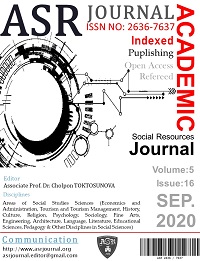Author :
Abstract
21. yüzyılda sanayi ve teknolojinin gelişmesi neticesinde artan globalleşmeye paralel olarak global çapta tehditlerin de artmasına vesile olmuştur. Bu tehditlerin en önde gelenlerinden birisi İslamofobi olarak kabul edilmektedir. Samuel Huntington dünya genelinde büyük yankı uyandıran “Medeniyetler Çatışması” isimli eserinde uluslararası iktisadi güce hâkim olabilmenin yolunun medeniyetlerin çatışması ile gerçekleşeceğini savunmuştur. Batı medeniyetine yakın bir görüşe sahip olan Huntington’ın İslâm medeniyetini bir tehdit olarak görmesi ve bu şekilde lanse etmesi kitleleri etkilemiştir. Soğuk Savaş sonrası dönemde Komünizm tehdidi ortadan kalkan Batı için yeni düşman İslâm medeniyeti olmuştur. Bununla beraber 1960’lı yıllardan itibaren Batı’ya işçi göçlerinin artması ve bu göçlerin genellikle Müslüman ülkelerden olması da, Batı’da tedirginliği arttıran unsurlar arasında olmuştur. 11 Eylül 2001 tarihinde Amerika Birleşik Devletleri’nde gerçekleştirilen terör eylemleri sonucu İslâmiyet’e karşı hissedilen korku ve tedirginlik zirveye ulaşmıştır. İslamofobi olarak tanımlanan bu durum, 2015’te Avrupa genelinde gerçekleşen yeni terör eylemleri ile gündemdeki yerini korumuştur. Dini amaçlı terör, yapılan tüm faaliyet ve eylemleri dine bağlayarak, din adına yasallaştırarak kendini kabul ettirmeye çalışan bir grup bireyin gerçekleştirdiği, şiddet ve vahşet içeren eylemlerdir. Son dönemde gerçekleşen tüm terör eylemlerinde İslâmi grupların olması, yaptıkları eylemleri Kur’an-ı Kerim’e dayandırmaya çalışması neticesinde Batı’da İslamofobik düşünce daha da benimsenmiştir. Araştırmanın tarihsel çerçevesinde İslamofobi’nin tarihsel gelişimi “Medeniyetler çatışması” teorisine dayandırılarak geçmişten günümüze bilgilere yer verilmiştir.
Keywords
Abstract
In the 21st century, in parallel with the increasing globalization as a result of the development of industry and technology, it has also led to an increase in global threats. One of the most prominent of these thdits is considered to be Islamophobia. Samuel Huntington has argued that the way to dominate the international economic power is through the clash of civilizations in his work titled “The Clash of Civilizations”, which has a great impact around the world. The fact that Huntington, who had a close view to the Western civilization, saw the Islamic civilization as a threat and presented it in this way affected the masses. In the post-Cold War period, the new enemy for the West, whose communism threat was removed, became the Islamic civilization. However, the increase in worker migration to the West since the 1960s and the fact that these migrations are generally from Muslim countries have been among the factors that increase the anxiety in the West. The fear and anxiety felt against Islam as a result of the terrorist acts carried out in the United States on September 11, 2001 reached its peak. This situation, defined as Islamophobia, has kept its place on the agenda with the new terrorist acts that took place across Europe in 2015. Terrorism for religious purposes is acts involving violence and brutality, carried out by a group of individuals who try to establish themselves by binding all activities and actions to religion and legalizing them in the name of religion. As a result of the presence of Islamic groups in all terrorist acts recently and their efforts to base their actions on the Quran, Islamophobic thought has been further adopted in the West. In the historical context of the research, the historical development of Islamophobia is based on the "clash of civilizations" theory and information has been given from past to present.
Keywords
- Babayev, J. (2020). “Batıda Yükselen İslamofobinin Dinsel Amaçlı Teröre Etkisi”, Academic Social
- Resources Journal, (e-ISSN: 2636-7637), Vol:5, Issue:17; pp:523-534. ÖZET 21. yüzyılda sanayi ve teknolojinin gelişmesi neticesinde artan globalleşmeye paralel olarak global çapta tehditlerin de artmasına vesile olmuştur. Bu tehditlerin en önde gelenlerinden birisi İslamofobi olarak kabul edilmektedir. Samuel Huntington dünya genelinde büyük yankı uyandıran “Medeniyetler Çatışması” isimli eserinde uluslararası iktisadi güce hâkim olabilmenin yolunun medeniyetlerin çatışması ile gerçekleşeceğini savunmuştur. Batı medeniyetine yakın bir görüşe sahip olan Huntington’ın İslâm medeniyetini bir tehdit olarak görmesi ve bu şekilde lanse etmesi kitleleri etkilemiştir. Soğuk Savaş sonrası dönemde Komünizm tehdidi ortadan kalkan Batı için yeni düşman İslâm medeniyeti olmuştur. Bununla beraber 1960’lı yıllardan itibaren Batı’ya işçi göçlerinin artması ve bu göçlerin genellikle Müslüman ülkelerden olması da, Batı’da tedirginliği arttıran unsurlar arasında olmuştur. 11 Eylül 2001 tarihinde Amerika Birleşik Devletleri’nde gerçekleştirilen terör eylemleri sonucu İslâmiyet’e karşı hissedilen korku ve tedirginlik zirveye ulaşmıştır. İslamofobi olarak tanımlanan bu durum, 2015’te Avrupa genelinde gerçekleşen yeni terör eylemleri ile gündemdeki yerini korumuştur. Dini amaçlı terör, yapılan tüm faaliyet ve eylemleri dine bağlayarak, din adına yasallaştırarak kendini kabul ettirmeye çalışan bir grup bireyin gerçekleştirdiği, şiddet ve vahşet içeren eylemlerdir. Son dönemde gerçekleşen tüm terör eylemlerinde İslâmi grupların olması, yaptıkları eylemleri Kur’an-ı Kerim’e dayandırmaya çalışması neticesinde Batı’da İslamofobik düşünce daha da benimsenmiştir. Araştırmanın tarihsel çerçevesinde İslamofobi’nin tarihsel gelişimi “Medeniyetler çatışması” teorisine dayandırılarak geçmişten günümüze bilgilere yer verilmiştir. Anahtar Kelimeler: İslamofobi, Medeniyetler Çatışması, Terörizm ABSTRACT
